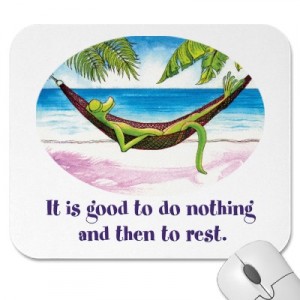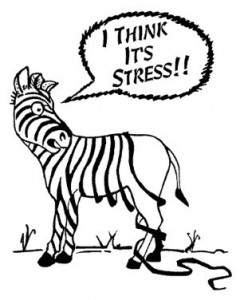She comes regular to class and has mastered the front kick and some blocking. In addition she has learned the meaning to many words like integrity, respect, teamwork and more. She is ready for Kindergarten and the 5/6 class at Balanced Life Skills.
How to Reduce Stress Part 3: Learning to Relax
 I have a t-shirt that I bought in one of the islands in the Caribbean that says, “It is good to do nothing and then to rest”. Just as it is important for us to have good time management skills and to work hard, it is also just as necessary to practice calming our mind and being still. For many it is very hard just to be still, to not be doing anything, to just relax. Relaxation is about being still physically while being alert mentally. Knowing how to ‘relax’ is one way of allowing your body and mind to rest, a very deep rest, which in turn allows you to build the energy you need for the rest of your activities.
I have a t-shirt that I bought in one of the islands in the Caribbean that says, “It is good to do nothing and then to rest”. Just as it is important for us to have good time management skills and to work hard, it is also just as necessary to practice calming our mind and being still. For many it is very hard just to be still, to not be doing anything, to just relax. Relaxation is about being still physically while being alert mentally. Knowing how to ‘relax’ is one way of allowing your body and mind to rest, a very deep rest, which in turn allows you to build the energy you need for the rest of your activities.
Imagine I ask you to hold yourself up on a chin up bar and hold it as tight and long as you possibly can. In a very short period of time you start to get tired and it becomes more difficult. Soon your muscles are aching and there seems to be no power in your hands or arm to continue to hold. Finally it becomes impossible – you let go and you feel great relief. If we did the same experiment and I asked you to hold yourself up on a chin up bar for 10 seconds and then you got a short break and then held yourself for 10 seconds with a break – you would be able to continue that routine for a much longer time, and the reason is you allowed yourself to relax your muscles.
If we never take the time to calm our mind and body, fatigue can set in quickly and everyday activities will seem harder for us and soon we simply do not have the energy to do even the simple things. This kind of relaxing is not the same as watching TV, napping, chatting online or even taking a walk. It can be accomplished in these ways though. Continue reading “How to Reduce Stress Part 3: Learning to Relax”
How to Reduce Stress Part 2: The Effect of Food on Stress
 We have all heard that ‘you are what you eat’. While we don’t eat stress, what we do eat can stress the cells in our body and brain, and they do know the difference between what is good for them and what is really just filler material – that most of the time is easier to get and can taste good. If we do not give our bodies what it needs you cannot be at your best, physically or mentally.
We have all heard that ‘you are what you eat’. While we don’t eat stress, what we do eat can stress the cells in our body and brain, and they do know the difference between what is good for them and what is really just filler material – that most of the time is easier to get and can taste good. If we do not give our bodies what it needs you cannot be at your best, physically or mentally.
First lets talk about healthy food that reduces stress. Our bodies are made up of 70% water yet most people only eat between 5 and 15 percent of water based foods in their diet. Immediately that causes a deficit of the most valuable part of the makeup of your diet. The water you get from drinking water and in fruits and vegetables actually allows you to think better, as the cell connections in your brain are aided by water. Eating foods that are water based, fruits and vegetables as the majority of your diet is the best.
However putting good food in is only one part of the system. Reducing or eliminating the bad things we put in our bodies is also an important step. Here are two of the biggest culprits in our diet that are not healthy choices and will increase the affects of our stress.
 Caffeine: hidden in more foods than you can imagine, can make you feel good short term, but can also increase sleeplessness and panic attacks.
Caffeine: hidden in more foods than you can imagine, can make you feel good short term, but can also increase sleeplessness and panic attacks.
 Sugar: Looks good, tastes great and is added to more prepared foods than you can imagine, will give you a quick high and then a big let down. The up and down effect can leave you wiped out.
Sugar: Looks good, tastes great and is added to more prepared foods than you can imagine, will give you a quick high and then a big let down. The up and down effect can leave you wiped out.
In our busy lives though, eating correctly is one of the toughest choices we have to make. Doing so though will make us feel better physically, mentally and just as important, we will know that we are doing the right thing!
How To Reduce Stress: A 10 Part series on reducing stress – Part 1 Do Something Physical
Without getting all scientific on you, there are many reasons that physical activity is great when you are feeling stressed. First when you are stressed out your body produces cortisol and that can make you feel even more nervous and anxious, even to the point of feeling sick. Getting active will use up some of that cortisol and that will help to reduce the nervous feelings.
Just as important the physical activity also produces a chemical – endorphins – that help you feel good! They improve your mood and help you slow down, as well as when you are tired you can sleep better. All of us know of the physical health benefits of exercise, but the mental health benefits are great too.
What is your favorite thing to do? Is it walking, dancing, martial arts, skateboarding, basketball, frisbee??? Any activity can be good and if you make it a habit to get some activity that you enjoy in everyday you will find your stress levels being reduced. But when we sit around or are dormant, or only worry about what we ‘have to do’, then our stress levels will go up.
One warning; Do not let physical activity become a distraction to the point of being an escapism method. Physical activity and especially sports and teams can become overwhelming if we are over achievers and only add more stress to our lives, if we are trying to fit too much in to our schedules. Finding the balance of some physical activity everyday while continuing to work on the root causes of our stress is the best.
Stress: Part 3 – Escapism as a coping tool
 When you have reached the limits of your abilities to cope with stress in your life, you may still be embarrassed, scared or so overwhelmed that you start taking part in escapist behaviors to try and feel better. For teens this may be skipping school, running away from home. For both adults and teens there may be a turning to drugs and alcohol, lying to people to avoid responsibility and it can get so bad that some feel so hopeless, that they may take to hurting themselves physically or even having suicidal ideation.
When you have reached the limits of your abilities to cope with stress in your life, you may still be embarrassed, scared or so overwhelmed that you start taking part in escapist behaviors to try and feel better. For teens this may be skipping school, running away from home. For both adults and teens there may be a turning to drugs and alcohol, lying to people to avoid responsibility and it can get so bad that some feel so hopeless, that they may take to hurting themselves physically or even having suicidal ideation.
Obviously any and all of these behaviors can bring on even more problems that can last a lifetime. Short term techniques to try to deal with stress are never as helpful as learning how to really deal with the issues or problems that are making us feel so overwhelmed. We will continue to talk about stress among children and teens in upcoming articles, but if you are a teen or child, just know that talking to an adult that you trust is a great first step and one that you should take for your own well being. If you are an adult being aware that our children, even the ones that seem to have it all together, may be feeling the pressures of their schedule or workload along with all the social pressures that teens have.
Being able to listen without judging, and knowing that you do not have to have all the answers is key to gaining the confidence of the child or teen. Recognizing the signs of stress and coping skills that they may be using can help us to get a head start on avoiding larger problems in the future. Coping with stress is something that all of us can do and we will discuss some of the basics in future articles.

